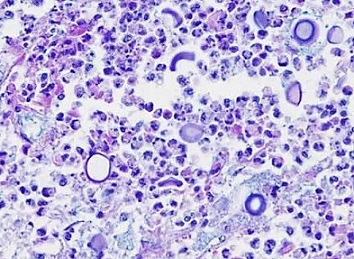Nikhil Prasad Fact checked by:Thailand Medical News Team Feb 18, 2024 1 year, 2 months, 1 week, 1 day, 11 hours, 10 minutes ago
COVID-19 News: As the COVID-19 pandemic unfolds, a growing body of evidence highlights the complex interplay between the viral infection and various opportunistic complications. Among these, cryptococcosis has emerged as a particularly concerning and life-threatening fungal infection in COVID-19 patients. This
COVID-19 News report aims to delve deeper into the epidemiology, clinical features, treatment outcomes, and potential risk factors associated with cryptococcosis in the context of COVID-19 in a study conducted by researchers from Universidad San Ignacio de Loyola-Peru, Universidad Nacional Mayor de San Marcos-Peru and Universidad Científica del Sur-Peru.
 COVID-19 Infections Can Lead To Development Of Cryptococcosis
Epidemiology and Clinical Features
COVID-19 Infections Can Lead To Development Of Cryptococcosis
Epidemiology and Clinical Features
Cryptococcosis, traditionally associated with compromised immune systems, is caused by the yeast Cryptococcus spp. However, the landscape is evolving, with an increasing incidence of cryptococcosis in COVID-19 patients. An in-depth analysis of the available data reveals that, while not as prevalent as other fungal infections linked to COVID-19, cryptococcosis has significant implications for patient outcomes.
Studies have shown that the majority of COVID-19 patients developing cryptococcosis are predominantly male, with a median age hovering around 60 years. What makes this finding particularly intriguing is the observation that a substantial proportion of these patients lack classic immunosuppression factors. Unlike other fungal infections associated with COVID-19, which often target individuals with weakened immune systems, cryptococcosis seems to affect a more diverse demographic within the COVID-19 patient population.
Risk Factors and Mortality
Understanding the risk factors associated with mortality in COVID-19 patients with cryptococcosis is crucial for devising effective management strategies. Male sex and advanced age have emerged as prominent risk factors, aligning with the broader trends observed in COVID-19 severity and mortality.
Intensive Care Unit (ICU) admission and the requirement for mechanical ventilation have consistently been identified as critical risk factors for adverse outcomes in COVID-19 patients. This is mirrored in the context of cryptococcosis, where patients requiring ICU care and mechanical ventilation face heightened mortality risks. The intricate relationship between the respiratory distress caused by COVID-19 and subsequent vulnerability to opportunistic infections, such as cryptococcosis, underscores the complexity of managing severe COVID-19 cases.
Additionally, secondary bacterial infections have emerged as a significant contributor to mortality in COVID-19 patients with cryptococcosis. The distinction between co-infections and secondary infections remains challenging due to the limited information available in the current literature. Nevertheless, the prevalence of bacterial infections, coupled with the already compromised immune state in these patients, accentuates the severity of the disease course.
Lym
phopenia, a common characteristic of severe COVID-19 cases, further exacerbates the risk of mortality in patients with cryptococcosis. The depletion of T lymphocytes, integral to the antifungal immune response, renders these individuals more vulnerable to cryptococcal infections. The intricate dance between the immune response to COVID-19 and the susceptibility to opportunistic infections unfolds as a critical factor in determining patient outcomes.
Treatment and Outcomes
While the treatment landscape for cryptococcosis in COVID-19 patients mirrors standard antifungal therapy, challenges arise in the timing of diagnosis. Cryptococcal infections often manifest several weeks after the initial COVID-19 diagnosis, posing a dilemma for healthcare providers in initiating timely and effective antifungal treatment.
Antifungal therapy, incorporating polyenes and azoles, remains the mainstay of treatment for cryptococcosis. However, the nuances of optimal dosages, treatment durations, and initiation timelines are yet to be standardized, contributing to the variability in treatment outcomes.
Despite advancements in antifungal therapy, mortality rates remain notably high. This underscores the need for ongoing research to explore innovative treatment modalities, enhance diagnostic precision, and develop targeted interventions that address the unique challenges posed by cryptococcosis in the context of COVID-19.
Challenges and Future Directions
The challenges associated with studying cryptococcosis in the context of COVID-19 are multifaceted. Limited data availability, particularly in the form of conference abstracts, underscores the necessity for standardized reporting guidelines. Comprehensive data collection methods are imperative to capture the intricacies of patient timelines, from symptom onset to outcomes, enabling a more nuanced understanding of the disease progression.
Furthermore, the dynamic nature of the COVID-19 pandemic, characterized by the emergence of new variants, presents an ongoing challenge for researchers. The impact of these variants on the susceptibility to opportunistic infections, including cryptococcosis, remains a subject of intense scrutiny.
Addressing these challenges necessitates a collaborative effort within the scientific community, involving rigorous data reporting, real-time surveillance, and a commitment to unraveling the complexities of COVID-19 complications. Only through such concerted efforts can we refine treatment approaches, optimize patient outcomes, and proactively respond to the evolving landscape of viral mutations.
Conclusion
In conclusion, cryptococcosis in COVID-19 patients is a formidable clinical challenge with profound implications for patient outcomes. Despite its relatively lower incidence compared to other fungal infections, its association with high mortality rates underscores its significance in the spectrum of COVID-19 complications.
Moving forward, ongoing research, standardized reporting, and collaborative efforts will be instrumental in refining our approach to managing this complex interplay between viral infections and opportunistic fungal diseases.
The study findings were published in the peer reviewed journal: Therapeutic Advances in Infectious Disease (Sage Journals).
https://journals.sagepub.com/doi/full/10.1177/20499361241232851
For the latest
COVID-19 News, keep on logging to Thailand Medical News.
Read Also:
https://www.thailandmedical.news/news/breaking!-u-s-cdc-and-u-s-nih-study-shows-an-increase-of-americans-dying-from-fungal-infections-in-the-midst-of-the-sars-cov-2-pandemic
